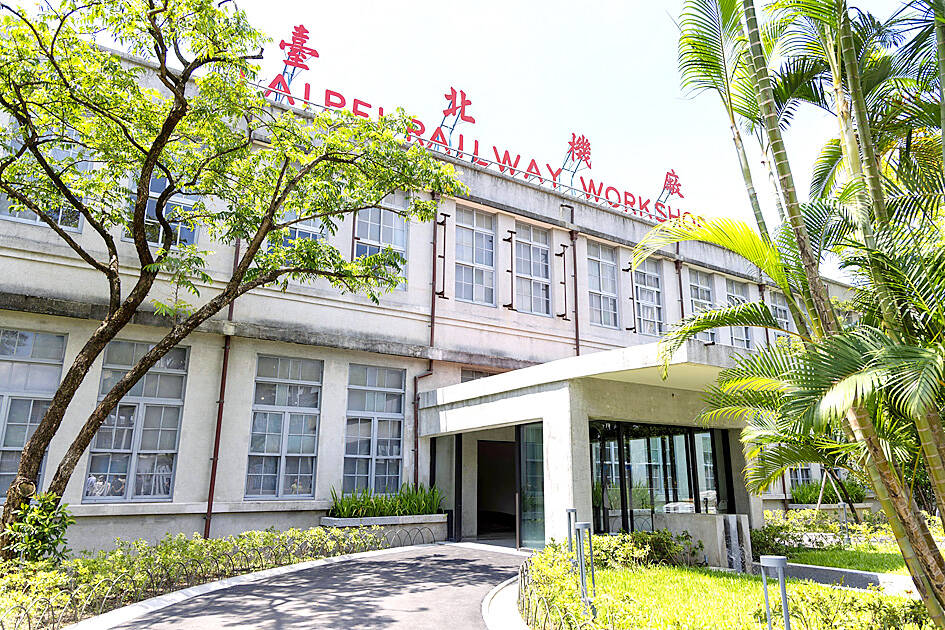The National Railway Museum is to partially open to the public on July 31 after nine years of restoration work at the historical site formerly known as the Taipei Railway Workshop, allowing visitors to revisit an important period in Taiwan’s railway history.
The areas to be opened to the public include a diesel workshop, a technician training institute, a materials testing institute, an assembly hall, a bathhouse, and a children’s area with trains built using toy blocks, the Ministry of Culture (MOC) said yesterday.
In addition, a 335-meter passageway that bisects the complex in Taipei’s Songshan District will also be available for public use, acting as a footpath linking Civic Boulevard and Keelung Road, it said.

Photo courtesy of the Ministry of Culture
This will improve pedestrian access, enhance neighborhood connectivity, and offer visitors a close-up view of the site’s historic architecture and skyline of industrial rooftops, it said.
People will be able to visit three permanent and three special exhibitions at the museum, covering topics from locomotives, the diesel factory, the bathhouse to Taiwan’s railway history and culture, and the life of late railway photographer Ku Jen-jung (古仁榮).
The MOC said Taipei Railway Workshop was relocated from the Beimen area to its current site and completed in 1935, where it served for decades as Taiwan’s hub for train maintenance, assembly and repair.
After the workshop was relocated to the Fugang Vehicle Depot in 2012, public advocacy led to the entire 17-hectare site being declared a national historic site in 2015.
In December 2016, the Cabinet approved a plan to transform the workshop into a museum, and by 2019, restoration work had begun, and a museum preparatory office was established.
The project adopted a phased approach: full-area preparation, sectional restoration and phased public openings.

The Ministry of Foreign Affairs (MOFA) yesterday voiced dissatisfaction with the Comprehensive and Progressive Agreement for Trans- Pacific Partnership (CPTPP), whose latest meeting, concluded earlier the same day, appeared not to address the country’s application. In a statement, MOFA said the CPTPP commission had "once again failed to fairly process Taiwan’s application," attributing the inaction to the bloc’s "succumbing to political pressure," without elaborating. Taiwan submitted its CPTPP application under the name "Separate Customs Territory of Taiwan, Penghu, Kinmen and Matsu" on Sept. 22, 2021 -- less than a week after China

ALIGNED THINKING: Taiwan and Japan have a mutual interest in trade, culture and engineering, and can work together for stability, Cho Jung-tai said Taiwan and Japan are two like-minded countries willing to work together to form a “safety barrier” in the Indo-Pacific region, Premier Cho Jung-tai (卓榮泰) yesterday said at the opening ceremony of the 35th Taiwan-Japan Modern Engineering and Technology Symposium in Taipei. Taiwan and Japan are close geographically and closer emotionally, he added. Citing the overflowing of a barrier lake in the Mataian River (馬太鞍溪) in September, Cho said the submersible water level sensors given by Japan during the disaster helped Taiwan monitor the lake’s water levels more accurately. Japan also provided a lot of vaccines early in the outbreak of the COVID-19 pandemic,

Kaohsiung Mayor Chen Chi-mai (陳其邁) on Monday announced light shows and themed traffic lights to welcome fans of South Korean pop group Twice to the port city. The group is to play Kaohsiung on Saturday as part of its “This Is For” world tour. It would be the group’s first performance in Taiwan since its debut 10 years ago. The all-female group consists of five South Koreans, three Japanese and Tainan’s Chou Tzu-yu (周子瑜), the first Taiwan-born and raised member of a South Korean girl group. To promote the group’s arrival, the city has been holding a series of events, including a pop-up

A home-style restaurant opened by a Taiwanese woman in Quezon City in Metro Manila has been featured in the first-ever Michelin Guide honoring exceptional restaurants in the Philippines. The restaurant, Fong Wei Wu (豐味屋), was one of 74 eateries to receive a “Michelin Selected” honor in the guide, while one restaurant received two Michelin stars, eight received one star and 25 were awarded a “Bib Gourmand.” The guide, which was limited to restaurants in Metro Manila and Cebu, was published on Oct. 30. In an interview, Feng Wei Wu’s owner and chef, Linda, said that as a restaurateur in her 60s, receiving an